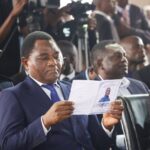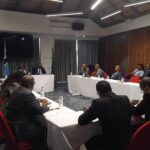LAST week, Energy Minister Makozo Chikote officially launched the 2025 Energy Week from August 4 to 8, 2025 under the theme “Advancing Towards a Sustainable Energy Future.”
Energy Week is an annual event aimed at raising public awareness of the government’s policies, reforms, and developments in the energy sector.
In his address, Mr Chikote said this year’s theme underscores the government’s commitment to attracting investment and ensuring the country’s long-term energy security, particularly in the wake of the severe drought experienced during the 2023/2024 rainy season.
He reaffirmed that the government remains determined to provide sustainable solutions and build robust, climate-resilient energy systems through a series of reforms in both the electricity and petroleum sub-sectors.
He announced that during the 2025 Energy Week, the Ministry had lined up a series of public awareness activities including radio programmes, school campaigns, lectures and exhibitions.
The main event was held at Barotse Mall in Mongu, bringing together stakeholders from both the public and private sectors.
Energy Weeks are held in various countries annually, with some prominent examples being:
1)Zambia
2)Chile
3)Panama World Energy Week
4)Finland Local Energy Week
5)Belgium EU Sustainable Energy Week
6)Russia- Russian Energy Week
7)Botswana SADC Sustainable Energy Week
8)South Africa- African Energy Week
The theme for holding these road shows is basically similar in what they emphasise.
The focus is usually pivoted on exhibiting innovation, discoveries, success, outlook and transformative policies.
In our context, the government decided to focus on highlights in both the petroleum and electricity subsectors.
Among the notable initiatives include the declaration of TAZAMA Pipeline as a common carrier and benefits, net metering, open access policy and the 100MW Chisamba solar plant.
Government has made significant progress in expanding energy access. Since 2021, the national electricity access rate has increased from 34 percent to 54 percent, with rural access rising from eight percent to 34 percent and urban access improving from 69 percent to 80 percent.
In addition, government reaffirmed its intention to continue driving the energy transition.
This is not the first time Zambia is hosting Energy Week. This means that we have learnt some lessons from previous editions and by learning from other countries which have been hosting this event for a long time. Without any doubt, there is a lot that is taking place in the energy space which needed to be emphasised.
Not too long ago, I was hosted on live call in ZNBC Radio 1 Bemba section to explain what is happening in the electricity subsector using vernacular language.
When the phone calls started arriving, I couldn’t believe the information gap between what Government is doing and what people are thinking.
Many people don’t know what net metering product is and how it would benefit them.
Other callers do not know that there is a huge international company in Zambia which sells solar kits of different sizes on credit for rural areas and payment is over a long period using mobile money.
I have come to a realisation that there is a significant information gap.
We are not using simple language when explaining. We are not using much local language when explaining.
If at all we are using it, we are not effective.
Therefore, when opportunities like Energy Week come, we need to dissect and assess what to beam to the audience.
One of the missed opportunities was to explain that 750, 000 Zesco customers who use up to 200 units have been given price discounts as a way of shielding them from bearing the brunt of the Zesco emergency tariff.
It is unprecedented for Zesco to reduce electricity prices.
We could also have included the growth of the industry over the past number of years.
Consumption in the petroleum sub sector has doubled. The industry is consuming $4 billion of fuels per year.
Definitely, employment figures have spiked. In the past three months, consumers have been saved K1.5 billion in pump price reductions.
According to the Zambia Development Agency (ZDA), committed investment in the sector is north of $20 billion and these investments are at different levels of development.
Just between 2021 and 2024, a total of 45, 988 jobs were recorded in the sector. There are significant salient factors to beam to the audience in a manner that is easy to understand.
When doing a teaching methodology course at Harvard University to augment my profile, we learnt that effective pedagogical practice is not just about how you package your lessons but how you deliver the same and how regularly you assess the impact using different methods of feedback.
The same can be applied to our energy context. The packaging of the government programmes and initiatives and how to communicate them and assess the impact they are having is critical.
In conclusion, I wish to commend Government for sustaining the annual Energy Week event.
If the public awareness activities including radio programmes, school campaigns, lectures and exhibitions did take place, it means we are moving in the correct direction. Next year, we can improve and include drama groups on radio stations.
.The author is an energy expert, consultant, and a Fellow of the Engineering Institute of Zambia, Email: j_chikwanda@yahoo.com
ENERGY WEEK & AWARENESS: ARE WE DOING ENOUGH?










